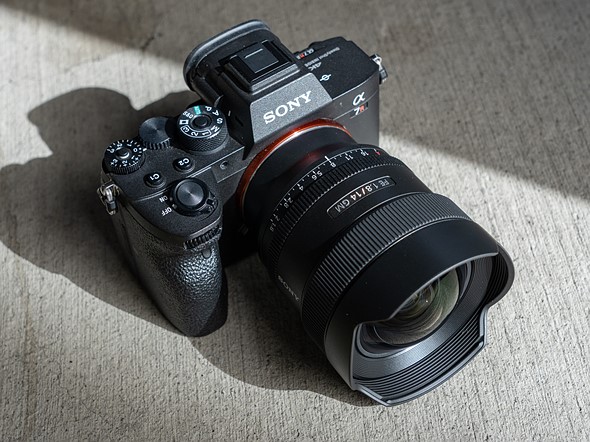 |
Every December, when the time comes to choose my gear of the year, I usually pick a product I’ve used extensively over the past few months. Which makes sense – if there’s a product I enjoy using, chances are I’ll pick it up a lot and get to know it well.
2021 is a bit different. This year, I knew what my gear of the year was going to be after just one trip with it: the Sony 14mm F1.8 GM. I instantly connected with this lens, and it hardly came off my camera.
It’s worth noting that this isn’t the first ultra-wide-angle lens I’ve picked as my gear of the year. It’s not even the second. To be precise, this is the third time I’ve selected an ultra-wide lens as my gear of the year. Previous picks included the Sigma 14mm F1.8 and the Laowa 15mm F2, both of which are outstanding lenses in their own right, and I still stand by those choices. They’re great lenses.
 |
Photographers gather on a ledge to photograph the North Window at sunrise (with Turret Arch in the background). |
Now, some of you may be asking, ‘Dale, what gives? Are you just a sucker for ultra-wide-angle lenses?’
No, I don’t think so. Well, maybe. OK, probably. The jury’s still out.
I’ll acknowledge there’s a pattern here, and it’s an interesting one for someone who always says 35mm is his favorite focal length (and usually has a Fujifilm X100 semi-permanently strapped around his neck). That said, I’ve never picked a 35mm lens as my gear of the year. Go figure.
What inspired me to try the Sony 14mm F1.8 was a road trip to Arches National Park, one of the most iconic national parks in the southwestern US. After months of staring at computer screens, I was ready to spend quality time staring at open skies and red rocks instead.
 |
| Exploring the aptly named ‘Fiery Furnace’ at Arches National Park Sony 14mm F1.8 GM |ISO 125 | 1/400 sec | F8.0 |
I usually take ultra-wide lenses for landscapes and night skies, but on this trip I wanted to capture the intimate spaces and slot canyons of the park, which meant hiking with it. The Sony’s small size made it seem like a great choice, so into the bag it went. That turned out to be a great decision.
I instantly liked the Sony 14mm because it makes a great walk-around lens during the day yet still has the fast aperture I want once the sun goes down. That’s something I never experienced with either the Sigma 14mm or Laowa 15mm. The Sigma is more than twice as heavy and is substantially larger, and the Laowa, while similar in size, is a manual focus lens. That’s not a deal-breaker, but it makes it less versatile for spontaneous shooting.
In contrast, the Sony was a perfect walk-around lens. It’s relatively small, weighs less than your brain tells you it should, and still has a fast F1.8 aperture. It’s one of those lenses you look at and think to yourself, ‘There’s got to be a compromise here – what is it?’
Except that, as near as I can tell, there aren’t many compromises. Sure, if you look at test charts you’ll find imperfections, but I’ve never run into a test chart when shooting in the wild. I imagine they grow on trees somewhere, but I’ve never been to that forest.
The Sony 14mm F1.8 delivers where it needs to in the real world. Images are sharp corner-to-corner, even wide open, and exhibit lots of contrast. When used with the Sony a7R IV, the lens resolves every pixel the camera throws at it. It also produces nice sunstars. Even coma is well-controlled – as well or better than on the Sigma or Laowa lenses, in my experience. That’s great for night sky photography.
Of course, at DPReview, we tend to geek out on every performance metric in the book, and there’s a place for that, but when the rubber hits the road, the most important metric is whether a particular product works for you.
The Sony 14mm F1.8 works great for me. The fact that it’s technically outstanding contributes to that, but it’s the combination of small size, minimal weight, quick AF, and excellent technical performance that matters to me, which is why it’s my 2021 gear of the year.
I’m a bit worried about 2022, however. What happens if nobody introduces a new ultra-wide lens in the next year? Maybe I’ll go off the deep end and shoot everything through a fisheye lens. If I do, you can be sure to read about it in my gear of the year column next December.



